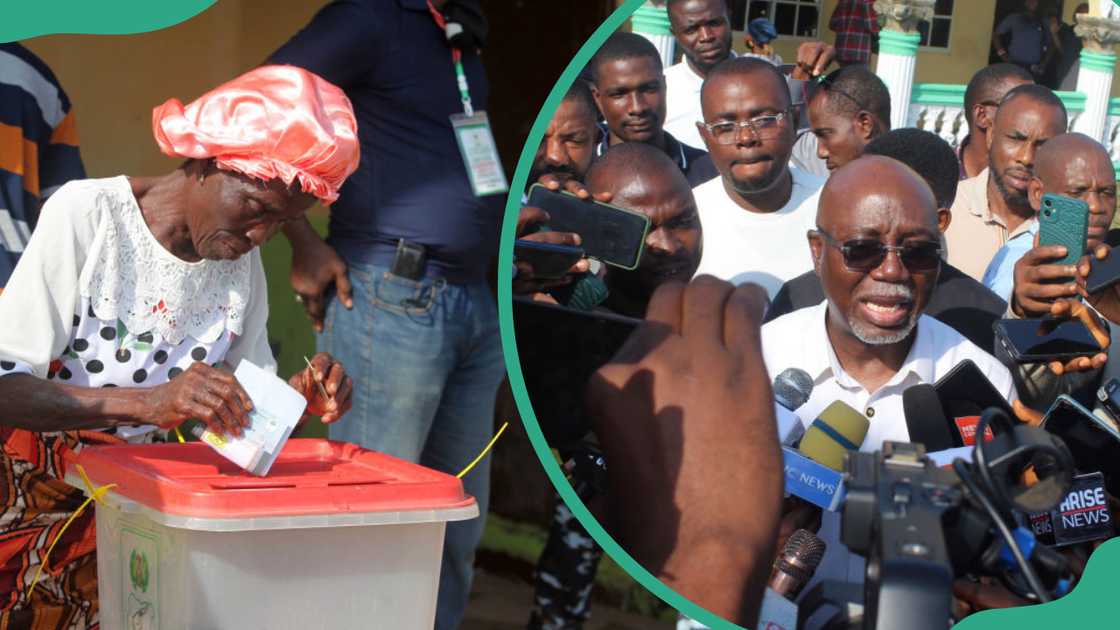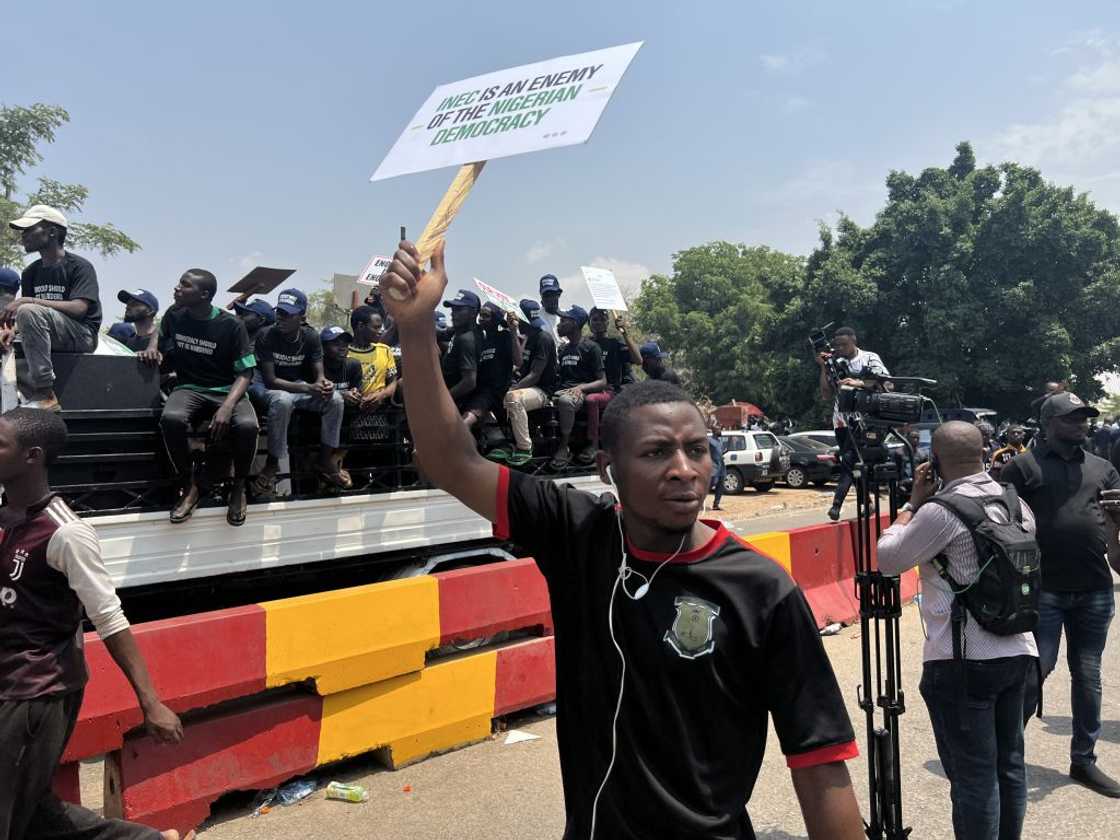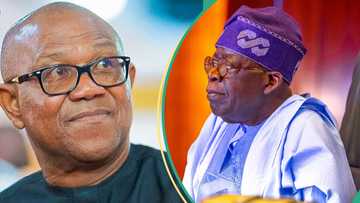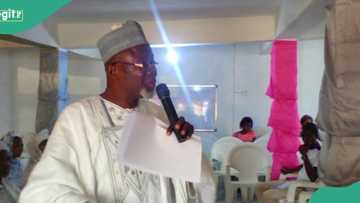10 ways of fighting political apathy in Nigeria: A comprehensive guide
Political apathy is when citizens seclude themselves from political activities and affairs in their country. This is because they have a negative feeling about elections; hence, they adopt a political behaviour characterized by inaction. This attitude among Nigerian citizens is a result of many factors. Here are some of the ways of fighting political apathy in Nigeria today.

Source: UGC
TABLE OF CONTENTS
- Ten ways of fighting political apathy
- 1. Educate people about government and policies
- 2. People should take responsibility for the country's problems
- 3. Participating in electoral processes
- 4. Citizens should understand and defend their rights
- 5. Active involvement in the current affairs of the nation
- 6. Development of political culture and interests
- 7. Motivating Nigerians to improve their lives by having a keen watch on the political situation in the country
- 8. Use of mass media/civil societies to educate and sensitize rural residents on political matters
- 9. Encouraging diverse views in political arenas
- 10. Following up on the fulfilment of political promises and manifestoes
- What are the reasons for political apathy?
- What are the effects of political apathy?
- Reasons for fighting political apathy
- What are the solutions to political apathy in Nigeria?
- What are the forms of political apathy?
- Why is political apathy a problem?
- What is political apathy in civic education?
Political apathy in Nigeria has negatively impacted the nation by slowing its economic development. The main reason the phenomenon is apparent in Nigeria and other countries worldwide is that citizens consider themselves powerless. Find out ways of fighting political apathy in Nigeria.
Ten ways of fighting political apathy
There are several ways to discourage political apathy in Nigeria. Below are some of the ways to fight it.
1. Educate people about government and policies
According to many political analysts, by equipping yourself with political knowledge, you build a motivational force to achieve your interests and make decisions that conform to your preferences. Therefore, the more educated a person is, the more likely they are to vote.
With more extensive knowledge of politics, Nigerians can develop trust in the political system, further motivating their participation in voting.
2. People should take responsibility for the country's problems
A contributing factor of voter apathy is that many people hesitate to own the collective dilemmas they face. However, having that approach in mind means that you can stand up and help resolve national and local issues. If Nigerians want to impact the outcome, they need to participate in the country's daily issues.
3. Participating in electoral processes
If Nigerians decide to come in a large voting turnout during elections, they will develop the confidence to elect a leader of their choice. In turn, the belief in powerlessness in voting will diminish.
4. Citizens should understand and defend their rights
Many Nigerian citizens should be exposed to their rights so that if their rights are violated during voting, they can protest and create petitions in court, thereby ensuring fairness. This will encourage people to turn out in huge numbers to participate in government-related activities.
5. Active involvement in the current affairs of the nation
Nigerians should be part of political parties like the NLC (Nigeria Labor Congress) party, APC, PDP and others. This will facilitate their involvement in the current affairs of the nation.
6. Development of political culture and interests
Nigerians can attend government events and public meetings to familiarize themselves with the system. This will help them make it a habit of being involved in political issues in the long run.
7. Motivating Nigerians to improve their lives by having a keen watch on the political situation in the country
Nigerian citizens should be made aware that unhealthy relations among opponent parties directly impact their livelihoods. By doing so, they will want to get involved in political activities to better their lives.
8. Use of mass media/civil societies to educate and sensitize rural residents on political matters
The government should use mass media to educate its citizens on the importance of being at the forefront of the country's issues.
9. Encouraging diverse views in political arenas
The country should create an accommodating political environment. This way, anyone willing to vie for any position will not feel left out because their ideas do not match those of the majority.
10. Following up on the fulfilment of political promises and manifestoes
Nigerian citizens should hold the government accountable for any mismanagement or dysfunctionality in the nation by ensuring that their manifestoes are all met.

Source: Getty Images
What are the reasons for political apathy?
Voter apathy results from voters' lack of interest in choosing their leaders in a democratic election. Citizens are discouraged from participating in the electoral processes for various reasons, such as limiting political participation directly through discriminatory government policies or indirectly through slow, inefficient, or non-representative administrations.
If a government employs both direct and indirect methods, its citizens will be politically disengaged since they believe their actions will change little or nothing. Many Nigerians fail to participate in government-related issues for the following reasons.

Read also
Peter Obi counters Tinubu on state of nation, says "Nigeria's reversing, declining," gives reasons
- Bad governance: The government of Nigeria rules in a carefree manner, making people lose morale in undertaking any politically related activities. Therefore, they ignore the governmental issues because they view it as a waste of time.
- The incompetence of electoral bodies: In past Nigerian elections, survey respondents voiced their concerns about the impartiality and independence of the electoral body and electoral fraud, which discouraged public participation in electoral processes.
- Election rigging: This practice is common in Nigeria. Often, losing parties accuse their competitors of electoral malpractices after the general elections.
In the 2019 Presidential elections, the main opposition party, the Peoples Democratic Party (PDP), accused the ruling All Progressives Congress (APC) party of rigging the elections. The aftermath is that citizens develop a mentality that no matter the level of security provided during an election, stealing must take place either directly or indirectly.
- History of political occurrences: Many Nigerian citizens still fear being victimized in the election process, tracing back to past experiences of losing family members, friends, and relatives. A typical example is the death of 636 people during the 2019 presidential elections in Nigeria.
- Violent campaigns: Sometimes, some political parties carry out their campaigns violently, which can lead to people losing interest in government issues.
- Inadequate security measures during campaigns and elections: Tight security measures are necessary during campaigns. This way, voters can participate in elections without fearing being attacked or bullied by their opponents.

Read also
New Year: Islamic cleric releases 2025 prophecies, predicts what will happen from Jan to Dec
What are the effects of political apathy?
Political apathy generally interferes with economic growth, government processes, and society. Below are the five effects of political apathy:
- It breeds a bad government that is vulnerable to high corruption levels in a country. Also, the rise in poverty levels weakens government institutions and results in lower-quality government services and infrastructure.
- The emergence of thugs and greedy politicians who take leadership positions, thereby embezzling government resources meant for the citizens.
- The slow pace of national development hinders proper public participation, ultimately affecting development.
- The phenomenon leads to insufficient political information and education.
- Political apathy leads to low voter turnout and reduced participation in democratic activities, undermining the legitimacy of elected leaders and the electoral process.
Reasons for fighting political apathy
The benefits of fighting political apathy in Nigeria are endless. Below are some reasons why Nigeria should seek answers for political apathy.
- This phenomenon is the reason for lousy governments. Thus, fighting it helps to keep a government accountable.
- It breeds ground for unqualified and illiterate personnel who declare themselves leaders. The result is mismanagement of human and material resources since a low management level controls the nation's resources.

Source: UGC
- It enhances communication between citizens and the government.
- With sufficient political education and information, there will be a functional government.
Many political analysts claim that political apathy is linked to political problems such as corruption and other unfair practices. Such practices have negative effects on the Nigerian economy.
What are the solutions to political apathy in Nigeria?
Political apathy in Nigeria is a significant concern that hinders democratic growth and good governance. Here are solutions to address political apathy in Nigeria:
- Introduce civic education programs in schools to teach the importance of voting and civic engagement.
- Conduct awareness campaigns through media platforms to educate citizens about their political rights and the impact of their participation in governance.
- Ensure free, fair, and transparent elections by adopting advanced technologies for voter registration and vote counting.
- Address electoral malpractices, such as vote-buying and violence, to restore trust in the system.
- Hold elected officials accountable for their campaign promises through regular town hall meetings and public forums.
- Encourage independent bodies and civil society organizations to monitor government activities and report corruption or negligence.
- Engage young people and women by promoting their inclusion in political parties and decision-making roles.
- Offer training and mentorship programs to prepare the youth for leadership positions.
- Address poverty and unemployment, as economic hardship discourages citizens from participating in politics.
- Provide incentives for political participation, such as community-based programs tied to voter registration.
What are the forms of political apathy?
Political apathy can manifest in various forms, including the following:
- Refusal to register and vote: Some people are not just interested in registering and voting in elections. They see it as a waste of time.
- Refusal to contest in elections: Some people are not interested in contesting elections.
- Refusal to join political parties: A politically apathetic person would most likely turn down the opportunity to join a political party. If offered the opportunity to belong to a political party, he or she would most likely say, ‘No, thank you; I am not a politician.’
- Refusal to protest: Political apathy also manifests itself in refusal to protest injustices in the system
- Refusal to join the fight against electoral malpractices: This is the act of not participating in the fight against electoral malpractices in one’s country.
- Refusal to listen to political news/affairs: This is the act of not showing interest in political/electoral affairs, mostly not listening to news about which political party is in government or which parties are contesting elections in the state.
Why is political apathy a problem?
Political apathy is a problem because it undermines the principles of democracy. It leads to low voter participation and disengagement from political processes. When people are indifferent to politics, the decisions that affect society are made by a smaller, less representative group.
What is political apathy in civic education?
Political apathy refers to a lack of interest or enthusiasm for political matters. Often, individuals disengage from politics for various reasons, resulting in a democracy not genuinely governed by the majority.
Political apathy has many adverse effects on a nation. The largest populations affected by its effects are the youth, minority groups, and the underprivileged. These groups should be politically active to bring about the real positive change they crave.
Legit.ng recently published a piece about dual citizenship and other types of citizenship in Nigeria. One can apply for dual citizenship in person by following a few procedures.
Read on to learn about the advantages of dual citizenship and a second passport.
Source: Legit.ng

Jackline Wangare (Lifestyle writer) Jackline Simwa is a content writer at Legit.ng, where she has worked since mid-2021. She tackles diverse topics, including finance, entertainment, sports, and lifestyle. Previously, she worked at The Campanile by Kenyatta University. She has more than five years in writing. Jackline graduated with a Bachelor’s degree in Economics (2019) and a Diploma in Marketing (2015) from Kenyatta University. In 2023, Jackline finished the AFP course on Digital Investigation Techniques and Google News Initiative course in 2024. Email: simwajackie2022@gmail.com.

Brian Oroo (Lifestyle writer) Brian has worked as a writer at Legit.ng since 2021. He specialises in lifestyle, celebrity, and news content. He won the Writer of the Year Award at Legit in both 2023 and 2024. Brian holds a BSc in Electrical and Electronics Engineering from Jomo Kenyatta University of Agriculture and Technology (JKUAT), earned in 2021. He completed the AFP course on Digital Investigation Techniques in 2023 and the Google News Initiative course in 2024. His email is brianoroo533@gmail.com







